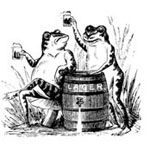
The Problem of Pleasure
THE ABOLITION OF PAIN
Jeremy Bentham won fame without much fatigue. His claim that nature has given us two masters, pleasure and pain, was bound to find favor among his readers. His teaching is unequivocal: We should maximize pleasure and avoid pain. Whether Bentham’s foundation is a sound one for ethics can be questioned. Yet it guaranteed him Lord Byron’s enthusiastic endorsement: Byron declared Bentham to be “the greatest man of his time, and possibly the greatest man of all time.” One normally expects an ethic to inform us of what we should do and, conversely, abstain from doing. Can one justify the title Ethics for a work whose foundation is the undeniable fact that pleasure is pleasant?
It would be ludicrous to think that it is necessary to “teach” people to enjoy what is pleasurable and to reject what is painful. Yet today one will hardly find a college ethics textbook that does not give Bentham prominent mention, even pride of place. One thing, however, is certain: He addresses a topic worth discussing, for to maximize pleasure and eliminate pain ranks very high in modern man’s agenda of priorities. This topic was addressed also by Plato, but his presentation differs radically from the British thinker’s: “Each of us has two counselors that are foolish and antagonistic,” said the Greek philosopher, “pleasure and pain.” Can modern man, simply because he is modern, claim that he is wiser than a Greek thinker born in the fifth century B.C.?
This king of Greek philosophy warned us that even though many of us might be defeated by pain, a much greater danger is to be defeated by pleasure — i.e., to be incapable of protecting oneself from its poisonous attraction. This is why he adds that one of the most important aims of education should be to train a child to achieve victory over pleasure.
From the very moment of birth, man is attracted to what is pleasant, sweet, comfortable, and enjoyable, and rejects violently what is harsh, difficult, and bitter. History teaches us that tribes and nations often trained their members to “endure” pain. In Indian tribes, when a young boy reached a certain age, he passed a “rite of initiation,” a sort of “maturity test,” by courageously refusing to be defeated by pain. To endure pain without flinching proved his manhood.
You May Also Enjoy
The interim report of the Synod on the Family shone a light on reformers who seem bent on transforming the Church into a replica of the Anglican Communion.
Reviews of Controversies: High Level Catholic Apologetics... In Good Soil: The Founding of St. Louis Priory and School, 1954-1973... Nourishing Faith Through Fiction: Reflections of the Apostles' Creed in Literature and Film
The book seemed absurd when it appeared in 1962. Sixty years later, lipstick-wearing men, sex changes, and overzealous population controllers are common.

